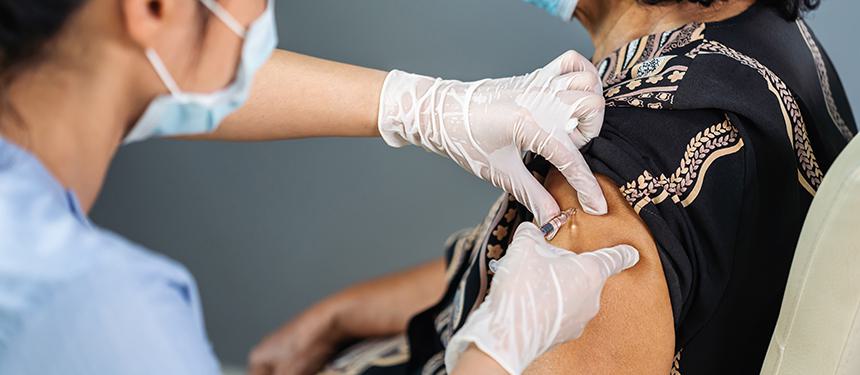Your questions answered about the AstraZeneca vaccine

Researchers at the University of Oxford started development of a Covid-19 vaccine in early 2020, using a genetically modified version of a chimpanzee adenovirus. They teamed up with the Anglo-Swedish pharmaceutical giant AstraZeneca to conduct successful human trials in the UK, South Africa and Brazil. The vaccine achieved Emergency Use Authorisation (EUA) in the UK on 30 December 2020 - within a year of the announcement of the first case of Covid-19 from Wuhan, China.
Since then the vaccine has been approved in 83 countries and is the cornerstone of the COVAX initiative to provide vaccines to low and middle-income countries (LMICs) around the world. AstraZeneca and the University of Oxford announced at an early stage that the vaccine would remain never-for-profit to LMICs and not-for-profit to all other nations while the pandemic was ongoing.
The vaccine consists of two jabs and has good efficacy of around 76% against symptomatic Covid and 100% efficacy against severe disease or hospitalisation. There were no safety issues identified in Phase 3 human trials. The most common side-effects with the Covid jabs in general are mild and short-lived, including localised soreness, fatigue, muscle aches and headaches.
On 7 April 2021, following investigations into reports of abnormal clotting effects of the AstraZeneca vaccine, both the UK regulator, the MHRA, and the European regulator, the EMA, announced similar findings... the benefits of having the vaccine far outweigh the risks for the vast majority of people.
What is the apparent problem with the AstraZeneca (AZ) vaccine?
The AZ jab has recently been linked to a small but concerning number of reports of blood clots combined with low platelet counts (platelets are cell fragments in our blood that help it to clot).
These include a rare clot in the brain called ‘cerebral venous sinus thrombosis’ (CVST). In the general unvaccinated population, there may be up to 15 or 16 cases of CVST per million people per year. However, the episodes under investigation consist of a combination of CVST, or other rare clots, with low platelets, and sometimes unusual antibodies - this has led to increased concern that there is a causative link with the vaccine.
What does the UK regulator recommend?
The MHRA’s scientific review of UK reports of extremely rare and unlikely to occur specific blood clots with lowered platelets has concluded that the evidence of a link with Covid-19 AstraZeneca vaccine is stronger but more work is still needed.
The MHRA recommended that recipients of the AZ jab should look out for new headaches, blurred vision, confusion or seizures that occur four days or more after vaccination. The MHRA also flagged shortness of breath, chest pain, abdominal pain, leg swelling and unusual skin bruising as reasons to seek medical advice.
The MHRA is not recommending age restrictions in COVID-19 AstraZeneca vaccine use.
However, the UK Joint Committee on Vaccines and Immunisation (JCVI) has advised that all Britons aged 18-29 years (the vaccine is not licensed for under 18 year olds) should be given the choice of an alternative vaccine to the AZ, when possible, provided they are healthy and at low risk of COVID-19 disease. This is because the risk of severe Covid in the under-30s with no underlying illness is very low, and therefore the JCVI feel that as a precautionary measure it is appropriate for those in this age group to be offered an alternative Covid vaccine.
What does the European regulator recommend?
The European Medicines Agency (EMA) has ruled that blood clots can be ‘very rare side effects’ of the jab. It has encouraged health professionals to communicate that people receiving the vaccine should remain aware of the possibility of very rare cases of blood clots combined with low levels of blood platelets occurring within two weeks of vaccination. There may be an age factor as well, as most of the cases reported have occurred in women under sixty years of age within two weeks of vaccination.
What does the World Health Organisation recommend?
The World Health Organisation’s advisory vaccine safety panel said that a causal link between the AstraZeneca Covid-19 vaccine and rare cases of blood clots with low platelets is “considered plausible but is not confirmed”. They continue to advise that the benefits of the vaccine far outweigh any reported adverse reaction and that vaccination should continue.
How many people have been potentially adversely affected by the AZ vaccine?
It is important to note that whilst concerning, the events under assessment are very rare, with low numbers reported among the almost 200 million individuals who have received the AstraZeneca COVID-19 vaccine around the world.
Up to and including 31 March, the MHRA said it received a total of 79 reports of cases of blood clots combined with low platelets, including 19 deaths, following more than 20 million doses administered of the AZ jab. That equates to about four cases for every million vaccinated individuals.
The MHRA added that 44 of the reports and 14 of the deaths related specifically to CVST with a low platelet count. Of the 19 deaths, 11 were in people under the age of 50 and three were in people under the age of 30.
The EMA’s safety committee examined a total of 86 cases of blood clots of which 18 had been fatal.
Have any of the other vaccines had similar episodes?
The EMA is examining three cases of venous thromboembolism blood clots involving the Janssen (Johnson & Johnson) jab. This uses the same adenovirus delivery mechanism as the AZ vaccine.
Two cases of blood clots with a low platelet count have also been reported among recipients of the Pfizer/BioNTech mRNA jab. Approximately 11 million first doses and 3.5 million second doses had been given, but no causative link has been established.
There have been no reports of this rare adverse effect with the Moderna mRNA vaccine.
It is important to note that this type of blood clot together with lowered platelets can rarely occur naturally in unvaccinated people as well as in people with Covid-19 disease, and that while evidence of a link with the AZ vaccine has become stronger, more research is needed.
What should you look out for if you have the AZ vaccine?
All medications including vaccines have some side-effects. The most common with the Covid jabs are mild and short-lived, including localised soreness, fatigue or aches and headaches.
Vaccinated people should seek medical assistance immediately if they have any one or more of the following symptoms, within 14 days of the administration of the AZ vaccine:
- Shortness of breath
- Chest pain
- Swelling in your leg
- Persistent abdominal pain
- Neurological symptoms, including: unusually severe and persistent headaches that progressively worsen over a few days; blurred vision; confusion; or new onset of seizures
- Unusual skin bruising or tiny blood spots under the skin beyond the site of injection.
What if you’ve already had your first AZ vaccine?
Anyone who did not have these side effects should come forward for their second dose when invited.
However, anyone who experienced cerebral or other major blood clots occurring with low levels of platelets after their first AstraZeneca Covid-19 vaccine dose should speak to their health professional and should have an alternative second jab.
All 79 cases of abnormal clotting in the UK occurred after the first dose, but that could be because far more people have received their first dose than their second.
Can CVST be treated?
Yes, once identified, the symptoms can be treated. It is thought that this condition is similar to another rare adverse reaction that can occur after administration of the blood thinner, heparin.
The treatment consists of hospitalisation followed by giving concentrated antibodies which block the effect of the antibodies that could be causing the clotting problems. Once the patient is stable this is then followed by oral anticoagulation agents, but not heparin, as this may exacerbate the problem.
Is CVST more common in women?
So far, most of the cases of CVST have occurred in women under 60 years of age, but no specific risk factor associated with age or gender has been confirmed.
In the UK, 51 of the 79 clotting cases and 13 of the deaths were in women. However, women were more likely to receive the AZ jab than men thus far, particularly those in the younger age groups with the UK offering priority vaccination to key workers (incl. healthcare workers) – reflecting the gender and age distribution of this demographic.
The data suggest there is a slightly higher incidence reported in the younger adult age groups.
The combined oral contraceptives, which contain oestrogen, have been associated with an increased risk of blood clots including CVST, deep vein thrombosis and pulmonary embolism. They are probably the commonest cause of CVST.
Pregnancy predisposes to thrombosis, therefore women should discuss with their healthcare professional whether the benefits of having the vaccine outweigh the risks for them. Similarly, individuals with health conditions that leave them with increased risk of blood clotting should also discuss the benefits and risks of vaccination with their healthcare professional.
How have different countries responded to the recommendations?
On 11 March, Norway and Denmark halted administration of the AZ vaccine following reports of several cases of CVST combined with low platelet counts. Nineteen European countries subsequently either paused the vaccine or banned the use of particular batches. The UK and Belgium continued vaccinating, pending investigation by the regulators.
Most countries have now resumed vaccinations with the AZ jab, though Norway and Denmark are still awaiting their own evaluations.
- Resumption without restriction: Austria, Bulgaria, Cyprus, Iceland, Ireland, Latvia, Lithuania, Romania
- Only for over 65yr olds: Finland, Sweden
- Only for over 60yr olds: Netherlands, Germany, Italy, Philippines
- Only for over 55yr olds: Canada, France, Belgium
- Only 55-65yr olds: Spain
- Only for over 50yr olds: Australia
- Alternative offered for under 30yr olds: UK
Remember that vaccines are the best way to protect people from COVID-19 and have already saved thousands of lives. Everyone should continue to get their vaccination when asked to do so unless specifically advised otherwise.




